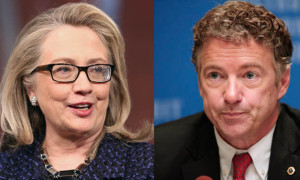I wrote a post several years ago contrasting a good initiative by Senator Rand Paul of Kentucky and a statist proposal by Senator Chuck Schumer of New York.
There was no connection between the two ideas, but I thought the comparison helped show the difference between someone who instinctively wants more freedom and someone who reflexively thinks there should be more government control.
 Let’s do the same thing, but this time highlight a difference between Rand Paul and Hillary Clinton, particularly since the two of them may be rivals in 2016.
Let’s do the same thing, but this time highlight a difference between Rand Paul and Hillary Clinton, particularly since the two of them may be rivals in 2016.
First, let’s look at what Rand Paul recently said about corporate inversions, which is what happens when an American company decides to re-domicile in another jurisdiction (generally through a cross-border merger).
Senator Rand Paul told Futures magazine that the rush of American companies moving operations outside of the nation is due to failed authors of the U.S. tax code. …“I blame the tax code and those who wrote the tax code,” said Senator Paul regarding the record number of inversions by U.S. companies. …Senator Paul said that antiquated tax laws have made the U.S. uncompetitive against countries in North America and Europe and called for Members of Congress to take a moment to recognize their faults. “…we should’ve brought a big mirror, so [Congress] could look in the mirror and see where the problem is. The problem arose from legislators who wrote a crummy tax code. The problem arises from having a corporate tax cut that is twice what Canada’s is and nearly three times what it is in Ireland. Money goes where it’s welcomed, and money has been flowing overseas. I don’t fault corporations for doing what they’re supposed to do, which is maximize their profit.”
This isn’t the first time Senator Paul has made wise observations about the taxation of multinational companies. He also was one of the few lawmakers who defended Apple for the tax strategies the company used to protect the interests of workers, shareholders, and consumers.
Now let’s look at Hillary Clinton’s recent contribution to the tax discussion.
In a recent interview, she basically bragged that she and Bill paid a larger share of their earnings to the IRS than the average household with similar income.
She argued to the Guardian that her family’s wealth would not injure her ability to talk about income inequality on any hypothetical campaign trails. “But they don’t see me as part of the problem, because we pay ordinary income tax, unlike a lot of people who are truly well off, not to name names; and we’ve done it through dint of hard work.” …are they truly paying more taxes than your average multi-millionaire, as she suggested? The Clintons last released their tax returns during Hillary’s 2008 presidential run. From 2000 to 2007, they paid $33.8 million in federal taxes, or 31 percent of their adjusted gross income — which was $109 million. At the time, the IRS said that taxpayers making $10 million or more — i.e. the people safely in 1 percenter territory — were paying 20.8 percent of their adjusted gross income in federal taxes.
Wow, bragging about paying above-average taxes.
In other words, assuming that she actually plans to run for President, she thinks that an inability to properly and intelligently manage her own finances is a reason to let her manage the nation’s finances.
Though at least she’s being philosophically consistent. After all, folks on the left act as if getting to keep any of our own money is some sort of special favor from Washington.
P.S. I can’t resist noting that Hillary thinks giving speeches is “hard work.” Since I occasionally get paid to give speeches (though only a tiny, tiny fraction of the $200,000-plus that she receives), allow me to state for the record that it is the easiest money to earn.
But I guess if you’re a former politician, it seems like “hard work” to actually go through even a modest bit of effort in exchange for money.
P.P.S. I also can’t resist pointing out that the Clintons are going through a lot of effort to minimize their exposure to the death tax, so even they have a limit when it comes to needlessly giving money to government.
